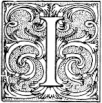 t’s been another one of those days that take everything you got and a little bit more. You’re walking down rain-wrought streets, inner city symphony and you’re oh so weary. Too weary to go home and face your four walls. Your stack of bills, dusty rusted life. You just want to take a break from all these worries. So you tuck in here, following a sign, the hand pointing you downward a short flight of steps. You reach a door, thick, wood hardened by time and salt. There’s a small pane of glass cut into it, frosted, but when you lean your forearm against it you see light and colour. You imagine making this your place. Putting in your time, coming every day, day after day until you can use words like Regular and Usual. You’ll pull up a stool, put a foot on the rail and a pint will be waiting. You’ll get relationship advice from the bartender. You’ll banter with the barbed-wire gargling, heart of gold waitress. You’ll swap war stories with the resident experts. You’ll see that your troubles are all the same. You’ll be balm for each other’s pain. It’s cold out here, so you push through the door, into warmth and noise. It’s everything you pictured. Dark oiled bar like a brass-railed schooner on a terrazzo sea. Only, it’s empty. Nobody shouts your name at your arrival. No one returns from a game of darts in the back to buy you a round. There are two college kids in ball caps, sitting in a booth watching the game on the teevee. They don’t even notice you. They’re not glad you came. It’s just another bar full of old glory gone sour in the taps. You just want to get away.
0 Comments
 e comes alone now. He arrives early in his brown three-piece tweed, in through the revolving doors squeaking like a mischief of mice. He pats at his white laurel of hair and moustache, but nothing can tame them now. He can’t work the automated teller and he always buys his ticket with change, counts it out to the penny, even though they don’t take those anymore. He doesn’t tip the greasy concession kid, whose pimples are the distant ancestors of the colony of acne that has lurked in the concession stand for generations. He takes the stairs one at a time, holding on to the brass banister with all the might left in him. He’s Sir Edmund Hillary making his final ascent, but there is no ticket-taker to greet him at the summit, no torch-bearing Sherpa to usher him to his seat. He’s on his own. He follows in the footsteps of others, etched into the carpet through years of pilgrimages to see opera singers, magicians, monologists and burlesque dancers. He stands at the top of the stairs to catch his breath. He feels the concrete blooming through the threadbare carpet. There’s no one to nag him on. He pushes through a veil of mothball and velvet and emerges onto the balcony. He settles into his seat with grunts and groans like an old house in winter. The springs are busted and the fabric torn. The chair beside him sits empty. He can barely see over the gold filigree edge. The theatre below is empty, except for a man snoozing in the front row and a pair of teenagers necking and fondling near the back. The stage has been surgically removed, a white screen stretched across where it used to be like a death shroud. They lobotomized the place and turned it into a picture house. He looks down, but he can’t read his ticket no matter how close he brings it to his face. He doesn’t know why he comes here or what he’s here to see. Something loud. Something to fill in two hours of his day, like the first snow on darkened street. And when the thing’s over he’ll still be here. Still alone. No one will hear his complaints. Just an empty chair next to him, empty on the cab ride home, empty at the dinner table. A cavalcade of barren chairs parading past him. Left to wither like a joke without the punch line. 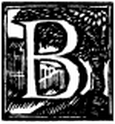 irch and bird call, mossy green, rocky stream and escarpment. If the hike had a soundtrack it would be the twang, twang of a jaw harp. It is the kind of day that he would call perfect. If he weren’t perfectly lost. It started with the goat shit back in the pasture. An omen he tried to wash off in the old swimming hole, but the brown froth there stank worse than the shit. He sits on a boulder here, dumps his rucksack and drains the last of his water bottle. He knows these woods like the back of his hand. Knew them, once. But his hands are looking less familiar every day, too. Wrinkled, hair silvering down the wrist. Yahoos on ATVs have wrecked the old trails and a fire ran through at some point. Probably lit by the same yahoos at some Pabst infused campsite. He scans the trees. Nothing looks the way he remembers. He can’t find it. Something itches at his palm and he turns it over. A stripe of orange. Furred and shivering in a slow procession across his skin. Caterpillar. He reaches out to pet it. The fur soft against his fingertip, feeling this instant of connection. This tie to mother nature. We’re all one, he thinks. His finger there on the single spine like a tuning fork. He feels at peace. Then he feels pain. A lot of it. Hornet sting pain. Root canal pain. Miniature hydrogen bomb pain. He knocks the caterpillar off and pinwheels back, falling onto a soft green cushion. Poison ivy, he thinks. Giant hogweed. It starts to rain. But it’s there, from his prone position, he spots it. Pushing back tamarack and vine to uncover it. The log. Running back into dense wood, rock and darkness. He puts his head into the opening. He can barely make out the pinhole of light at the other end. The sweet sick smell of decay. He eases in. It’s tighter than he remembers it. Shrinking, like people do as they age. Or maybe he’s let himself go. He has to tuck his arms in at his sides, stretch his legs out straight. He wriggles forward. The slime on the inside of the log helps him. It’s maybe eight feet to the eye of light, opening wider ahead of him. Just a little farther. A little more. Why didn’t he exercise more? Why did he eat so much? A little more. The smell is oppressive. Marching up his nostrils. Not decay, death. He tries to move his arm, but they’re both pinned now, his head jammed against the roof. Stuck. So close. Nobody knows he’s here. They wouldn’t find him for days. Years, even. He panics. His body convulsing. His head pops through a membrane of cobweb and he tastes fresh air. Sunlight. His arms are still trapped but he can move his head. The secret glade. His place. Like a time capsule. There, under the rocky shelf, right where he left it, his guitar in its case. Probably perfectly in tune, too. Tweet tweet a bird says above him. I’m not lost anymore, he whistles back. It may have started with shit, but he won’t let that be the word of the day. Something hits him in the back of the head. Flap flap of wings and caw caw overhead. The something runs down his neck and drip drips onto the rock below. But he doesn’t squirm. He doesn’t fight. If he just doesn’t move things can still be perfect.  t had taken three quarters of a bottle of champagne for her to break the first one upstairs. Swinging the heel of a particularly nasty open-toed Louboutin. Cracks spidering out over the surface before the first slab fell. Tell me, tell me, tell me, do. Seven years, just like that. Then another seven. And seven more. And seven. A personal equation of ruin stretching from the master suite to the mudroom. Slumped on the terrazzo, the tile smeared with blood. The heel had snapped and she’d been using her fist. Or what was left of it. This last one, a hand mirror, wood frame spackled with fake verdigris, had been a gift. It shattered like all the rest. The house was quiet now. The lights were out. There was nothing left to break. Tell me today, did all my friends have fun at play. She tried to count. Had there been ten? Eleven? More. Each one now multiplied. A thousand thousand mirrors, scattered like breadcrumbs behind her. She picked up the hand mirror, knocking the last piece out of it. She held it up. I can see... I can see… But there was nothing on the other side. Just the same old world. She was alone. 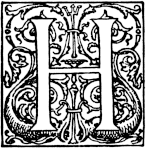 e was thinking about better days when the mower bucked in his hands and died, down at the far end of the big lawn, where the brush was stalking in, reclaiming territory. He pulled off the red sweatshirt he wore for yard work and gave the cord a pull. The engine coughed, the blade spun once and then stuck on something. There was the cry of a bird or a child. He looked toward the house. Nothing on fire. He needed to replace those shingles. And the siding. And a new coat of stain on the deck. Inside, the kids would be playing with their toys. Making believe, she called it. Making a mess was all he saw. They were old enough to start taking on responsibilities. He gave the lawnmower a kick. Life was not all skipping and tra-la-la. He pushed. He pushed some more. But it wouldn’t move. Mired in the deep. She’d have a field day with this. She’d told him he’d let the grass get too long. He strained. He struggled. He leaned into the mower with sisyphean commitment and quixotic tenacity. He just wanted the best for them, that was all. Wanted more for them than head in the clouds, feet in the shit. He flirted with strokes, coronaries and aneurysms. He pushed and with a final tearing sound, the mower moved a few inches. On the ground where it had been were the scattered chunks of red spotted mushrooms. Maybe some kind of fungus in the sod he’d laid down last fall. He’d bought it cheap off a shifty looking fellow with an ugly cat and a penchant for black cloaks. Always cutting corners, she said. He went down on one knee, searching through the grass. The shreds of some white fabric, like a tiny pair of pants from one of the kids’ dolls. He looked back at the lawnmower. Where the bag bulged, there was a dark liquid seeping onto the grass, staining it the colour of midnight and old dreams and ocean and blue, blue, blue. He’d clean the mess up quick. They wouldn’t have to see. 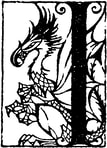 n here, one of the men said, stumbling into the darkness of the alley. The other one, hood drawn up, hugged a plastic grocery bag to his chest. They squat down on the concrete behind the dumpster. Black trash bags piled, oozing. Stinking. Spoon. Syringe. Light. Light. Lighter. I’m going first, one of them says. Like hell, the other. The flash of metal. A splash of blood. Patter of feet like gunfire and silence. He lay, curled up and burning like an autumn leaf, trying to hold it all in. There wasn’t going to be any final cinema reel of his life. He was just going to sputter out, like he began. Then, the sound of a bellows, breathing. A large shape from the shadows. Something reached for him. Like a lifeline cast out from a sinking ship. He grabbed hold. Warm. A long limb. Soft. Furred like Grandma’s shag carpet. Looking up into sad, sad eyes. The shape watched the man as he died. It remembered the laughter of children like bells tripping up and down the street. You kids! yelling the old shopkeeper. But they weren’t kids anymore. They weren’t invisible. They could never stop seeing once they saw. 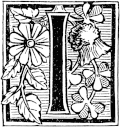 magine a castle. The kind your parents saw in squeaky spring cinemas that could only play one film at a time. The kind of castle Christopher Lee could brood around in. Imagine barbicans and battlements, towers and turrets, bodies swaying in gibbets. That kind of castle. Not a friendly place. Why are you here, so early in the morning? As if in answer, the drawbridge lowers. Down comes powdered rust like snow. Someone must have gone in the back to open it. Graffiti has been splashed across the two wooden doors, made illegible with time. The doors yawn darkly inward. You think about turning around. Any sane person would. But a distant sound draws you forward. The jolly lilt of a flute. Imagine ceilings too high for any ladder, windows only a giraffe could reach. You feel small and insignificant, as you always do, only more so. And there in the middle of the floor: a mountain. Not a mountain, a boot. You circumnavigate the toe. Imagine the herd of cows that would need slaughtering, the hide stretching and drying and tanning and stitching, to make a boot of this size. Imagine the foot that slips inside it, causing earthquakes with each step. Imagine the ankle, the calf, the knee and up, way up, to the head like a small planet looking down at you. A hand closing around you, bringing you closer to an abyss of teeth like whitened tombstones. Flesh and bone ground to a fine red paste. Imagine all that. But instead all you find is a half circle of three chairs pulled up in front of a fireplace, the fire long since cold. A man, with his back to you, rocking. Just a man, not a giant. White hair, sagging skin. Rocking, rocking. Of his own accord or just the slow dying force of a pendulum, it’s impossible to tell. A wood recorder lies on the floor next to the chair. Imagine the song you could play with that. Sweet, sad. Friendly.  rom the tower, he watches their approach. Two meaningless black specks. He’s been alone for so long. Nothing but the echoes of ghosts to keep him company. He reaches down inside, blindly fumbling around the pit of his stomach. And there it is. Still, after all these years. A hot marble. Anger. It rises from his belly, like bile or hot coals, rattling up his ribcage, clawing up his throat, filling his mouth, his nasal passages, running through his antlers like an electrical current, and finally, boiling down into his nose. They walk. They walk some more. They walk and walk and walk. And they stop. “How far have we come?” asks the Dentist. “A ways,” answers the Prospector. “How far to go?” “A ways away.” And then they stop stopping to walk. And they walk some more. As they walk, they sink. Deeper with each step. The temperature is rising, vapour wafting off the snow, clinging to them in grey strands. It’s like pressing through television static. They sink and the snow begins to tower over them on either side, slush sucking at their feet. A red light burns through the mist ahead of them. The air clears, pulling back like curtains to show walls and gabled roofs, gaping windows, a turret with a red light glowing in its window. A castle cut from the ice. It had been magnificent, full of colour and light. Now, streams of water run down the eaves, as the whole thing sinks. The two travelers stands in its shadow. High above them, the red light in the turret goes out. They climb the stairs. The Dentist can’t reach the knocker, so his old friend boosts him, grunting with the effort. “You got fat.” “You got old.” “Doesn’t everything.” Boom, boom, boom. The sound echoes through the structure. It takes minutes to fade, but no one comes. The Prospector leans against the doors, and they swing inwards, drooping on their hinges. As they enter the yawning halls, there’s the whiff of gingerbread and nutmeg. Then the rush of mold underneath. Tinkers and tailors, whittlers and cobblers: the place should be a buzzing hive as the crafters make the last push before the big day. But the workbenches sit empty, stools overturned. Holly and ivy hang like corpses from the rafters. Their footsteps echo, the Prospector loping and the Dentist scurrying to keep up. They pass one hall after the other, a straight line like a throat, heading deeper and deeper toward the belly of the place. They finally reach the end. A little light from the window hits a chair in the centre of the room. A throne. Built from antlers. The Dentist counts: One, two, three… A red glow lights up the rest of the scene. The Dentist sees more: Four, five, six, seven… The Reindeer is seated on the throne. Sprawled unnaturally, like a man. His nose glows red. A darker, more crimson red than they remember. Eight, the Dentist finishes. Eight pairs of antlers. The Reindeer slides from the throne and finds his hooves. The shreds of a blue vest hangs from his shoulders: the remnants of the Walmart takeover. He paces a wide circle around the others, as they spread out to meet him. The Prospector spins his pickaxe, the metal glinting in the half-light. The Reindeer paws the ground and snorts. The Dentist tries to remember anything from the Brazilian jujitsu class he took last year in Tarzana. Everything goes still and silent like a thread pulled tight. The Reindeer’s nose glows brighter than ever. A supernova. It lights up all their faces. The lines and scars. They’re not friends anymore, thinks the Dentist. Friends are people who spend time together. Who know each other. Who can hurt you the most, but don’t. But these are not my enemies, thinks the Reindeer. Their only enemy is time. The time that was stolen. The time they’ve wasted. Another year, thinks the Prospector. Another year almost gone. The red light in the room fades. The Reindeer’s nose dies out to black and he drops his head. The Prospector lets his pickaxe fall to the floor. The Dentist relaxes his stance. “I want to go back,” he says. But no one is listening. The others sit on the floor, dejected. The Dentist reaches into his parka and brings out the wad of papers. He crumples them up and lights them with a pack of matches. The flames curl the ends of the paper: “Agreement for the sale of Christmas T…” The final word already burned away. As he searches for scraps of wood to pile on top, his foot hits something. He leans down and picks up a wooden soldier. Only half-carved. He finds his scalpel and gets to whittling. It comes out cleanly and quickly from the wood. Old habits. He makes the lines softer and cuts out the rifle. “What’re you doing?” The Prospector leans over him. “Making a gift.” He carves a smile onto the face. Something kind. “For who?” He doesn’t answer, because he doesn’t know yet. There are other wooden blocks scattered across the floor. So much left to carve. The Prospector goes to the cupboard and pulls out the old things. He gets dressed. Fur pants and suspenders, red wool and wooden buttons. He sits on the throne to pull on the black boots. The Reindeer returns, dragging the sleigh out of storage. The Prospector eases him into the harness, gently placing the bridle between his teeth. The Dentist runs his hand along the tarnished brass rail where the reins are still looped. The oak boards have been eaten by rot and worms. It would fall apart, tomorrow or next year. But for now it would hold together.  he roar of the rotor fills him, like the slow, sick revolution of his soul. His body’s numb. Not from the cold but from skipping across the world like a small stone. Skip from west coast to east, skip over the Atlantic to London, skip on to Oslo, skip to Svalbard, skip skip skipping nowhere, to the very edge of the map. He rubs the frost from the window and peers down. Water and ice and something else: the dark hulking forms of the rigs anchored off the coast. He’d left a heatwave in L.A. and already heat was part of his past, like innocence and good cheer. For the past three days, they’ve been stuck at the ice station waiting for the storm to clear, crouched by the radio, drinking schnapps and eating from cold cans of spaghettios. This morning he’d been ripped from his tent by the pilot and stuffed in the helicopter, both of them still drunk from the night before. The pilot shouts something at him in Norwegian. Too much to hope for a crash: sudden heat and fiery end. The helicopter descends toward a bald white expanse. Below a figure waves them down. He feels inside his parka to make sure the papers are still there. Four sheets versus several thousand miles. The pilot is shouting at him again. He doesn’t understand. He doesn’t understand anything. But as he leans closer, the pilot reaches past him, swinging the door open and shoving him hard into empty space. It’s maybe eight feet, but it feels like Alice’s rabbit hole. Tumbling through cold, smelling cold, tasting it, the cold sinking into his pores, down into his soul. He never thought he’d come back. But here he is. He opens his eyes to see the Prospector towering over him. Hs fiery beard and moustache so white with age, or frost, he almost looks like his old boss. He opens his mouth to say something but the wind is howling, the storm closing in again with shards of ice blowing in from the sea. The Prospector pulls him to his feet and they stumble toward a mound of snow. A dark hole is cut into it. A cave. They fall through the opening together, into darkness. The floor is sticky. It’s warm. Hot, even. The feeling creeps back into his body. He rolls onto his back, the Prospector beside him. His chest burns. He can’t catch his breath. The Prospector pokes him in his side. “You got fat.” “You got skinny.” He pokes back. “It goes both ways.” “What does?” “Getting old.” They lie in silence for a while, like old friends or people who used to know each other. “You bring it?” He pulls out the papers. He can’t read anything in the dark, but he remembers the gist. “Seven figures.” “It’s worth more.” “That’s what they’re offering. It’s good money. Silver and gold, right?” “I don’t want it.” He remembers the message. Was it only last week? The satellite service and lag so bad he could hardly recognize the voice. “You asked me for help. You told me to organize a sale.” “I changed my mind.” “I came seven thousand kilometers! I cancelled patients!” His shouts don’t echo. The cave just eats up the sound. “Where the hell are we?” “Someplace warm.” A smell reaches him. A stink. He pulls off a glove and touches the floor. Sticky and hot. He staggers to his feet and pushes back through the opening. The ice has turned into a steady snowfall, but the wind’s died down. He sees the red slash of the cave opening. The snow stained in front of it, the blood already freezing black. He brushes some of the snow on the mound away, showing the white fur of his old friend. He reaches into his parka and touches the large tooth hung from a strap around his neck. His first patient. The Prospector stands beside him. “I still need your help.” “With what?” The Prospector doesn't answer. He tugs his toque down low over his eyes and pulls his pick out of the ice. He turns and walks off into the wastes. He doesn’t look back. He doesn’t have to. They both know the way home.  othing. He licks the edge of the pickaxe again. Still nothing. He brushes the snow off and gets back to his feet. Takes his time because it takes longer now. Even as the days dry up like raisins toward the end of the year, everything takes longer. And it hurts. Standing, walking, existing. It all hurts. He stamps his feet to get the blood moving, then grabs the chain and gives it a yank. The toothless beast at the other end moans, but with another hard pull it finally lumbers to its feet, breathing hard. The coast is only a short march now. Stagger is more like it. He misses the dogs, but they’d needed to eat. One by one, and then they’d burned the sled for firewood. They haven’t been warm since. The wind is picking up, blowing snow, his breath forming crystals in his moustache and beard. He’ll have to be careful. Not stop again. Not for the frostbite. He’s had so much of that his skin is like rawhide, but he has to watch out for chasms. The ice is cracking up more and more, chunks drifting off. Soon there’ll be nothing left. He promised to be at the landing by sundown. Sundown being a relative term having nothing to do with light and dark. Everything is black as coal, as pitch. Blacker even. Has been for weeks, would be for weeks more. But a few dozen steps are all he can manage. He drops the chain and the beast behind him settles gratefully to the ground with a thump and a groan. Out of habit or hope, he tosses his pickaxe in the air and lets it fall, point first in the ice. Maybe this time. He jerks it out and licks the edge. Still nothing. No whiff of menthol to tell him Dig, dig here. He gives the chain a yank. Then another. Then another. But it doesn’t move. It lies there: a giant mound of white fur. He keeps yanking, but it’s just another useless motion. Like breathing. He lets the chain go. It’s hard to tell the fur from all the snow around it. Already it’s been covered up. Once, it had been so wild and feared. Then he broke and tamed it. Now, it’s just another lump. He turns back. The journey has to go on. You can’t stop it. Like the year, hurtling toward an end. As it went on after the peppermint mine played out, and the elves went on strike, and Walmart bought the whole operation up and then shut it down. You just have to put one foot in front of the other. But underneath his feet, there’s a crunching and snapping. Like the bones of a giant. He falls back on his ass, lines spidering out through the ice, water leaping up through the cracks. He digs in with his cleats, pushing himself back from the edge. He’s reached the coast. Then, a bubble of light shows through the blowing snow. For a minute he thinks, This is it. A red light in the sky. Blinking. He almost shouts. Wahoo. He almost believes. Things won’t have to change. They’ll reverse. His friends will undie. The water will refreeze. The drills will rise and the oil rigs will retreat. But then there’s the slow, spinning sound of rotors above him to tell him there's no magic. It just goes on. Life. The helicopter descends. It’s relentless. He sticks the pickaxe in the ice to show them where to land. He buries it deep so it can’t be pulled up. Then he rubs his hands together and blows into them. He just needs a little feeling in his fingers so he can work a pen. So he can sign the contract. |
8bitmythsRemember when you were a minipop, and you saw that film, you know, the one you loved that never had a sequel? Well, let's say it did. And it was just like you imagined it, only a little bit worse.
|
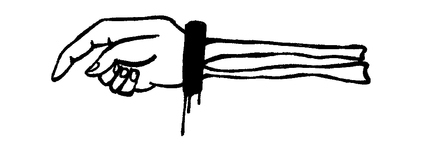
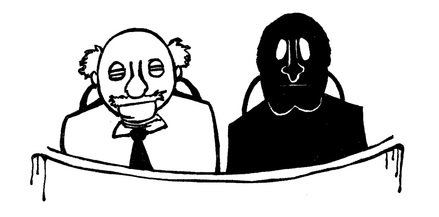
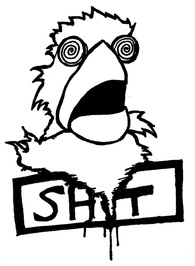
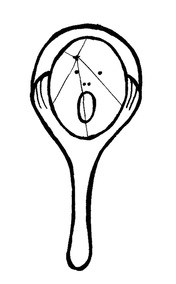
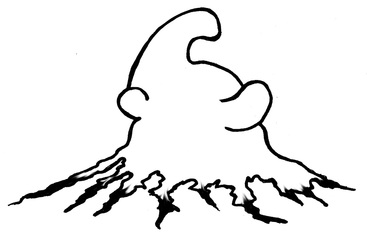
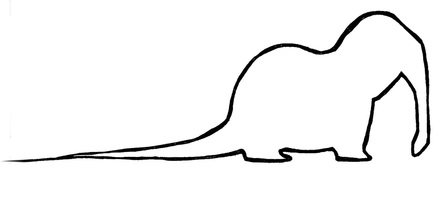
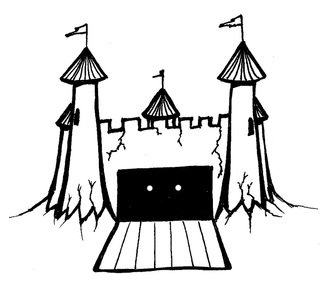
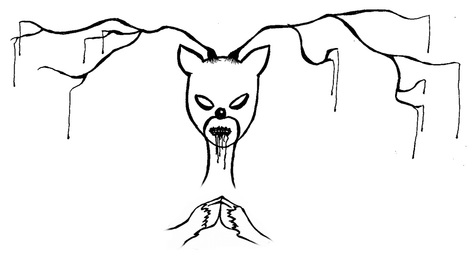
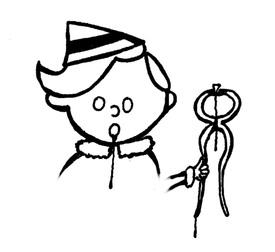
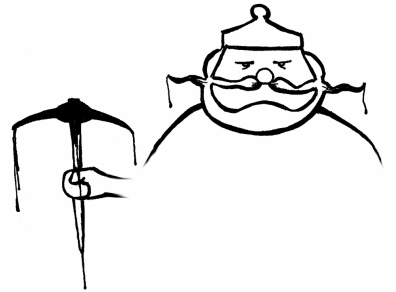
 RSS Feed
RSS Feed